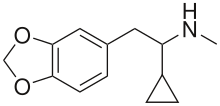UWA-101
 | |
| Legal status | |
|---|---|
| Legal status |
|
| Identifiers | |
| |
JSmol) | |
| |
| |
UWA-101 (also known as α-cyclopropyl-MDMA) is a
cyclopropyl group. MDMA has been found in animal studies and reported in unauthorised human self-experiments to be effective in the short-term relief of side-effects of Parkinson's disease therapy, most notably levodopa-induced dyskinesia.[1][2][3][4] However the illegal status of MDMA and concerns about its potential for recreational use, neurotoxicity and potentially dangerous side effects mean that it is unlikely to be investigated for medical use in this application, and so alternative analogues were investigated.[5]
Replacing the α-methyl with a cyclopropyl dramatically reduces affinity for the
UWA-121 is the (R)-enantiomer of UWA-101 and the (S)-enantiomer is UWA-122.[9] Both are active monoamine reuptake inhibitors.[9]
Another relative is UWA-104 ("α-isopropyl-MDMA"), which is also active.[6]
See also
- MBDB
- Methyl-K (UWA-091)
- Isohexylone
- UWA-001
- Zylofuramine
- RTI-83 - another drug which selectively increases dopamine and serotonin levels without affecting noradrenaline
References
- S2CID 41609012.
- PMID 14534244.
- S2CID 24601744.
- PMID 21562283.
- ^ Jerome I (Spring 2008). "MDMA and Parkinson's: Lots of Research, Few Practical Answers" (PDF). MAPS. XVI (1): 16–18. Archived (PDF) from the original on 2011-09-15. Retrieved 2012-04-09.
- ^ S2CID 37589231.
- .
- (PDF) from the original on 2020-03-10. Retrieved 2019-09-18.
- ^ S2CID 37160397.
External links
- Do neurologists dance? A personal experience of Parkinson's disease & MDMA, Tim Lawrence, 2003
